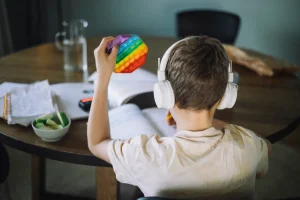
This post is an excerpt from the article published by Ready, Set, Sleep, a company dedicated to achieving excellence in ABA sleep programming. If you would like to get in touch with All About Kids for ABA services and evaluations, please click here.
Click here for the full post by Ready, Set, Sleep.
When it comes to supporting autistic learners, sleep is one of the most critical—and most overlooked—factors affecting their quality of life. Research shows that over 40% of autistic learners experience problematic sleep, including difficulty falling asleep, staying asleep, or achieving restorative sleep. These issues have far-reaching consequences, impacting not only the learner but also their families, caregivers, and the effectiveness of ABA interventions.
Yet, despite its importance, sleep content specific to the ABA community is incredibly hard to come by. This lack of resources creates a significant gap in care, leaving many BCBAs ill-equipped to address sleep challenges effectively. For a field that prides itself on evidence-based practices, why does sleep remain such an underserved area in ABA?
The Profound Impact of Problematic Sleep on the Autistic Community
Sleep disturbances aren’t just inconvenient; they profoundly affect nearly every aspect of an autistic learner’s life. Poor sleep is linked to:
-
Increased occurrences of maladaptive behaviors
-
Reduced emotional regulation
-
Heightened sensory sensitivities
-
Greater difficulty with focus and attention
For many families, sleep problems create a vicious cycle: poor sleep exacerbates problem behaviors, which in turn disrupt daily routines, making it even harder to establish healthy sleep habits. It’s a cycle that doesn’t just affect the learner—it impacts siblings, caregivers, and everyone in the household.
In the autistic community, these challenges are amplified by sensory sensitivities, co-occurring conditions like gastrointestinal issues, and pre-existing emotional dysregulation. The stakes are high, and the consequences of untreated sleep problems are far-reaching, influencing long-term outcomes for learners and their families.
Why BCBAs Are Struggling to Fill the Gap
Despite the significant role sleep plays in behavior and learning, most BCBAs receive little to no formal training on sleep interventions. ABA coursework often glosses over sleep, treating it as a peripheral issue rather than a foundational component of learner well-being. As a result, when faced with sleep challenges, many BCBAs resort to basic functional assessments or generic strategies that may not address the root causes of the problem.
Making matters worse, the field of sleep science is complex and rapidly evolving. Much of the research on sleep isn’t tailored to the unique needs of autistic learners, leaving BCBAs without clear guidance on how to apply these findings to their practice. This lack of accessible, actionable resources creates a gap between what the science says about sleep and what BCBAs can realistically implement.
Compounding this issue is the fact that sleep is a highly dynamic and sensitive skill, prone to disruption from environmental and developmental factors. Without the tools and knowledge to navigate these complexities, BCBAs often find themselves treating sleep problems outside their scope of competence—well-meaning, but ill-prepared.








